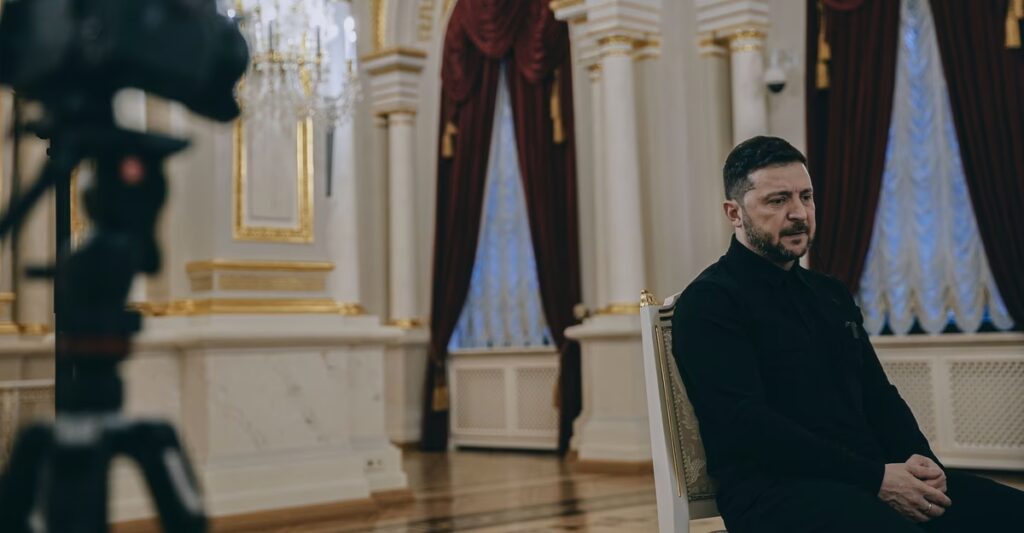In January 2021, about a year before Russia launched its invasion of Ukraine, President Volodymyr Zelensky celebrated his 43rd birthday at the home of his old friend and business partner Tymur Mindich. About two dozen guests showed up at Mindich’s place, inside a luxury tower known around Kyiv as the Monster, where Zelensky also owned an apartment. The party, held in violation of pandemic lockdown orders, generated embarrassing headlines. The president was forced to answer questions about why the rules imposed on ordinary citizens did not seem to apply to him and his friends.
Last week, similar questions arose after Mindich and his apartment appeared at the center of one of the biggest corruption scandals in Ukraine’s history. Investigators have accused him of using the apartment as the headquarters (or, as they put it, the “back office”) of a conspiracy to extort and launder about $100 million in bribes from companies in the electricity sector. Mindich was not at home when investigators arrived around dawn on November 10. A few hours earlier, at 2:09 a.m., he’d crossed the western border of Ukraine into Poland, having apparently been warned of the impending raid.
Corruption probes have on occasion targeted Zelensky’s administration, and he has often clashed with the agency behind the latest one, the National Anti-Corruption Bureau of Ukraine (NABU). But no investigation has posed a greater threat to the president’s standing among the people of Ukraine, who are again demanding to know how some of his friends seem able to flaunt the rules while the rest of the country suffers.
For months, waves of Russian drone and missile attacks have caused devastating blackouts, leaving people in Kyiv and other cities without power for up to 16 hours a day. By squeezing bribes out of the electricity sector, the alleged kickback scheme hindered efforts to protect the power grid and, according to NABU investigators, made the blackouts worse. Zelensky has not been implicated in the investigation, which NABU code-named Operation Midas. But the alleged involvement of his former business partner and several senior government officials has tarnished the president’s greatest asset among voters and allies: his image as a leader in the mold of Winston Churchill, a tireless defender of Ukraine and Europe from the forces of Russian tyranny.
The timing is terrible for him. As the war approaches its fifth year, Ukraine has faced months of setbacks on the battlefield, and the Trump administration has intensified its pressure on Zelensky to make a deal with Russia on humiliating terms. The revelations from Operation Midas will make those challenges steeper.
A few days after the raid on Mindich’s apartment, Zelensky held a video call with a handful of the U.S. senators, including Lindsey Graham and Richard Blumenthal, who have supported Ukraine throughout the war. The official readout of the call did not mention the corruption scandal. It focused instead on Zelensky’s requests for further American assistance, and the legislation that Graham and Blumenthal have sponsored to impose a fresh round of sanctions on Russia and its allies. But afterward, some of the participants fumed in private over Operation Midas.
“It’s just infuriating,” a person close to one of the senators who spoke with Zelensky told me. (Like others interviewed for this story, the person spoke on the condition of anonymity to discuss sensitive matters). The senators had been relieved to learn that the president was not directly targeted in the investigation. “But really, the buck stops with him,” this person said. “And seeing this kind of stuff—it’s just, like, Get your shit together.”
Zelensky waited a couple days after the raid on Mindich’s apartment before making a detailed statement about it. The president then imposed sanctions on Mindich to freeze his assets in Ukraine. “Right now, it is extremely difficult for everyone in Ukraine—enduring power outages, Russian strikes, and losses,” Zelensky said in a public address on November 12. “It is absolutely unacceptable that, amid all this, there are also some schemes in the energy sector.” In the same speech, he promised that his government would fully support the NABU investigation.
Then the president tried to change the subject. He traveled to Paris at the end of last week to agree on the purchase of French fighter jets. From there he flew to Istanbul in the hopes of reviving the peace process with mediation from the United States and Turkey. According to Ukrainian media reports, Mindich is hiding out in either Israel or Austria. (My attempts to reach him have been unsuccessful.)
[Read: Ukraine’s underground generation]
Ukrainians are now fixated on an obvious question: How could such an elaborate scheme play out for so long under the president’s nose? “It’s devastating,” a longtime Zelensky associate told me by phone from Kyiv as news of the scandal spread. “Speak to anyone on the streets, anyone on the front lines, everyone on social media—they are only talking about this.”
One of the most uncomfortable consequences for Zelensky has been the way the scandal has dredged up his past. By the time he ran for president, in 2019, Zelensky had amassed a net worth from the entertainment business estimated at more than $25 million. In his most popular sitcom, Servant of the People, he starred as a high-school history teacher whose profane rant against corruption gets him elected president of Ukraine.
The show aired throughout the presidential race, and it helped the Zelensky campaign cast him as an outsider to the country’s ruling clans. In reality, he had many friends among them; his campaign received support from a powerful Ukrainian billionaire. In the second year of his presidency, a leaked trove of financial data known as the Pandora Papers revealed that Zelensky made extensive use of offshore bank accounts. (His apartment in the Monster was registered under his wife’s name through a shell company in Cyprus.)
Many of his friends and business partners also earned fortunes in the entertainment industry. A lot of them knew Zelensky from his hometown of Krivyi Rih, where they started out performing comedy together in the 1990s. In the early 2000s, his group of friends formed a production company called Kvartal 95, or “District 95,” in honor of the neighborhood where most of the founders grew up. The company thrived, producing hit sitcoms and rom-coms for audiences in Russia and Ukraine. Mindich became one of its biggest investors.
After Zelensky won the election, some of his friends and associates took places in Parliament and the presidential administration. He seemed to like it that way. On the campaign trail in 2019, Zelensky told me that he wanted to bring his own team with him to the presidency rather than relying on “professionals” and technocrats to help him govern. “The scariest thing,” he said, “is to lose the people you have around you, the ones that keep you grounded, that tell you when you’re wrong.”
In practice, his friends from the entertainment industry have seldom made effective statesmen. In 2019, Zelensky appointed Ivan Bakanov, a childhood buddy and longtime business partner, to lead Ukraine’s main intelligence agency, the SBU. Among the agency’s primary tasks was to gather information on Russian war plans and prepare to counter them. Instead, Bakanov and his subordinates downplayed the warnings of an imminent invasion. Some of them defected when it started in 2022. One was arrested a few months later in Serbia with cash and precious gems in his suitcase. Even after that arrest, Zelensky took more than a month to remove Bakanov from the agency’s leadership. “They grew up together,” one of his aides later explained to me. “He didn’t want to just throw him away.”
Corruption scandals have often provoked Zelensky’s sense of loyalty. He tends to see them as unfair, a sign of nefarious interests working against him. In early 2023, his aides informed him that officials in the defense industry were lining their pockets, and he ordered them to deal with the problem quietly. Senior officials in the Biden administration implored Zelensky to fire and prosecute the offenders as a deterrent. He refused. Only about six months later, after details of the graft became public, did the president oust the minister of defense.
[Read: How Ukraine turned the tables on Russia]
When we talked about the incident a few weeks later, Zelensky urged me to look at the bigger picture. He ran for president in 2019 on a promise to fight corruption, and he intended to keep that promise. But he could not afford to fire people at the first suggestion of wrongdoing. Especially in the middle of a war, he said, he had to weigh the value of such purges against the need to keep his team united. “We don’t have so many teams to spare,” he told me. “Our best people are exhausted. They make mistakes, bad decisions, or weak ones.”
Zelensky’s allies in the U.S. and Europe had by then provided Ukraine with tens of billions of dollars in military aid, and I asked whether they pressured him not to tolerate any signs of corruption. The president flipped the question around. Some of his allies, he said, would jump at any excuse, including corruption, to stop providing aid. “It’s not right,” he said, “for them to cover up their failure to help Ukraine by tossing out these accusations.”
This summer, as NABU closed in on some of his friends and allies, Zelensky intervened. His party’s majority in Parliament passed a law in July that would have revoked the anti-corruption agency’s independence and placed it under the president’s authority. Semyon Kryvonos, the director of NABU, has said the new law would have scuttled Operation Midas, which by then had been under way for more than a year. Widespread demonstrations broke out in defense of NABU and its partner agency, the Special Anti-Corruption Prosecutor’s Office. Ukraine’s allies warned Zelensky that any move to neuter the agencies would force them to cut off the flow of aid and weapons. “We told him, if you do this, everything stops,” a senior European diplomat told me. Zelensky decided to back off.
A few weeks later, one of his close advisers invited me to lunch in Manhattan, a short walk from Ukraine’s mission to the United Nations. He had arrived as part of the advance team for the president’s appearance at the UN General Assembly. The weather was warm for late September, so we picked an outdoor place to eat near Turtle Bay and, over the noise of the midday traffic, talked about the mood inside Zelensky’s circle and the situation at the front. After a few minutes, my companion changed tack.
“We’re on the eve of some big corruption scandals,” he told me. “It’s going to be a real distraction.” He then offered a long and not terribly convincing disquisition on defense procurement in Ukraine and how close relationships between the military and its suppliers might raise suspicions of corruption. His broader point was that Zelensky had not created this system and its vulnerabilities. It emerged organically from the pressures of the war, which required military units to raise funds in order to buy equipment directly from manufacturers. “This is not a Zelensky question,” he said. “It’s a systemic question.”
The details of Operation Midas tell a more specific story. As part of its investigation, NABU bugged several locations around Kyiv, including Mindich’s apartment in the Monster. The building, at 9a Hrushevskoho Street, owes its nickname to its bulk; it looms over the government district like an ugly ziggurat. The wealthy and powerful have long resided there, and few places in Ukraine are more associated with the country’s ruling class.
“They were very self-confident,” Kryvonos, the NABU director, said of the suspects recorded in that building. Some of them allegedly tried to keep tabs on NABU, effectively pursuing their pursuers. “Documents were found in their offices showing that they monitored the movement of our cars,” Kryvonos told the prominent news outlet, Ukrainska Pravda. “For about half a day after that, they spoke in whispers. But then they got right back to it: a million here, a million there.”
So far, Ukraine’s allies have not threatened to withhold any support as a result of Operation Midas. The White House has made no public comment about the scandal at all. Yesterday Zelensky met in Kyiv with an envoy from the Trump administration, Secretary of the Army Daniel Driscoll, to discuss the latest attempts to revive the peace process.
“It’s not in our interests to back away now,” the senior European diplomat told me. “We are safer if Ukraine stands than if it falls.” But the corruption scandal, he continued, poses a threat to Zelensky and his allies because it could inspire regular Ukrainians to turn against their government. “You could lose the war that way too,” the diplomat said.
[Read: Europe is answering Putin’s challenge]
As the scandal plays out, Zelensky’s best chance of containing the damage may be to embrace NABU’s work and instruct other agencies to do the same. “That would show there really is political will,” Kryvonos told Ukrainska Pravda last week. “We want this operation to bring about real changes.” For that, he continued, the president “needs to understand that we are trying to help him, because we want the system to start getting healthier.”
Zelensky has pledged to support the investigation in every way he can. But the response from his aides so far has been to defend the president and his reputation. They cannot afford to taint his image as an icon of courage and integrity, even though that image has made him more resistant to reform. “It’s gone to his head,” one of Zelensky’s close aides told me recently. “Every time he goes to Europe, they treat him like a superhero. Then he comes back home and gets these questions about corruption. It brings him down to earth, and he doesn’t like that.”
The remark reminded me of a famous scene from Servant of the People. In the eighth episode of the show’s second season, Zelensky’s character, the accidental president, struggles to persuade members of Parliament to pass tough laws against corruption. When they refuse, he has a vision of mowing all of them down in the plenary hall with a pair of submachine guns, their bloated bodies jerking as the bullets spray. The violence of that scene proved too much for some viewers. But Zelensky, as one of the creators of the show, wanted the character to stir debate about corruption, and just how much it would take to defeat it in real life.
The post Zelensky’s Blind Spot appeared first on The Atlantic.




